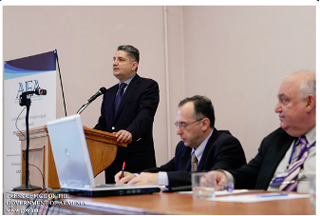“Why nations fail”

On October 19 the Armenian Economic Union organized annual conference at Yerevan State University.
The conference hosted experts and high ranking officials. Prime-Minister Tigran Sargsyan was invited, too. Official statements mostly refer to the Prime-Minister’s speech and provide scarce information about the message of Daron Acemoglu, who is ethnic Armenian from current Turkey, works in the United Sates and is considered one of the ten best economists in the world. Daron Acemoglu addressed a message to the conference participants via Skype. Participants of the conference say that his speech was not translated into Armenian, so many people in the room did not understand it. Media did not write or publish anything about what Acemoglu said at the conference. The reason why media did not inform anything about this message is that Acemoglu presented his theory about why nations fail, highly unequal distribution of wealth and compared his theory with Armenia.
In 2012 Daron Acemoglu and James Robinson published a book, “Why Nations Fail: The Origins of Power, Prosperity, and Poverty.” Acemoglu and his colleagues find the reasons of unequal distribution of wealth in the connection of businesses and politics, and failure or success is mostly conditioned by effective economic and political institutions. Acemoglu’s idea is the following: poor countries are poor primarily due to the fact that those countries have extractive governments which block the prospects of economic and long-term development. Extractive economic institutions cannot provide efficient protection of property rights, rule of law, equal conditions for everyone, and cannot stimulate innovation and growth. Acemoglu explains that extractive institutions are the ones that extract from people, resulting in unequal distribution of wealth. Such governments are far from creating “equal rules of the game.” In such systems there is lack of stimulus for working, investing and innovating, and the political power is vested in a small group on the expense of the rest of the society. The important thing in this theory is that such powers do not appear on the top by chance, and they choose their way consciously as they tend to satisfy their interests on the expense of the state and their society.
Accordingly, main reasons of success or failure lie not only in economic policies but political institutions as well. According to this theory, personal interests of a small group of people that control the power and their attempts to stay higher than the majority of the society block economic and political competition, resulting in a failure for the country. In other words, it does not matter if development projects are offered for separate sectors, if governments commit to make reforms, the country advances in international reports, the country will be poor and will fail if there is no democracy, rule of law, protection of property rights, equal rules of the game, and the power and money is vested in a small group of the society. Let’s agree that this picture or words are very familiar to Armenians.
Daron Acemoglu said that he is not an expert in Armenia, but he can say that Armenia’s problem is not geopolitical or cultural – it is political. “It is about making policies more responsive to the needs of citizens. Through such political process Armenia should stop being an oligarchy, become a society that will produce more stimulus for its people and unite the potential it has,” said Acemoglu.
He also said that in 1990 Armenia missed its critical point and failed to register drastic improvement compared to its past, which could become a base for institutional development. Armenia has a lot to do to develop institutions and grow. The economist believes Armenia’s next critical point will be democracy, “which now may enable people analyze and see the reasons of main problems, and solve those problems without great shock.”
As we see, Daron Acemoglu’s comments are straight forward and to the point. However, whether these opinions are essential for Armenia or no, many economists (including university deans and professors) that were present at the conference were napping during the teleconference as they did not understand English. However, Prime Minister Tigran Sargsyan was listening to the renown economist attentively and even taking notes.
By the way, Policy Forum Armenia (PFA) has published a report entitled “Corruption in Armenia.” One of the chapters of this report that was published in English is about the effects of corruption at macroeconomic level. This report outlines what the losses of the country and budget are because of corruption. The authors of PFA’s report have published concrete numbers and facts; we will write about this report in a separate publication. In the theoretical background of the report the authors mostly refer to the theory of Daron Acemoglu and James Robinson. Acemoglu writes the following about PFA’s report: “Some say that Armenia is doomed to fail economically because of its geography or location in the world. But like so many other countries around the world and throughout history, its failure is due to corruption, unscrupulous politicians and weak institutions. It’s not lack of opportunities but squandered opportunities that are at the root of Armenia’s ills, and it can make progress only by confronting this fact and holding accountable those responsible for the failures. This wonderful report is a first step”
By Babken Tunyan

























